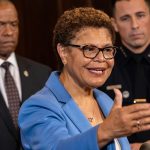California Governor Gavin Newsom attempted to deflect efforts to recall him by linking Monday to a website that blames “national Republicans, anti-vaxxers, Q-Anon conspiracy theorists and anti-immigrant Trump supporters” for the campaign.
Newsom linked Monday to the “Stop the Republican Recall” website, which declares on its opening page:
A partisan, Republican coalition of national Republicans, anti-vaxxers, Q-Anon conspiracy theorists and anti-immigrant Trump supporters.
According to the Los Angeles Times, they include “peddlers of Q-Anon doomsday conspiracies; ‘patriots’ readying for battle and one organization allied with the far-right extremist group, the Proud Boys.”
Instead of helping fight the pandemic, these partisan forces are pulling a page from the Trump playbook and attacking Californians.
Newsom’s opponents, however, include Democrats as well, such as left-wing billionaire mega-donor Chamath Palihapitiya, who appeared to launch his own campaign for governor earlier this year.
It’s on. #RecallGavinNewsom https://t.co/r8Cwd4szrn
— Chamath Palihapitiya (@chamath) January 26, 2021
Newsom’s rivals have collected roughly 2 million signatures ahead of the March 17 deadline — some 500,000 more than needed, enough to defeat an attempt to have signatures disqualified.
The San Francisco Chronicle noted Monday that Newsom could adopt a “long-shot” strategy of convincing enough signatories to change their minds:
Once the recall campaign turns in its petitions, county election officials have until April 29 to count how many registered voters signed and report their numbers to the secretary of state’s office.
The state then has 10 days to tally the counties’ results. If the recall campaign has qualified, it starts the signature-withdrawal period, in which voters get 30 business days to let their local election officials know they’d like to remove their names from the petition. Voters are offered the chance regardless of whether the Newsom campaign tries to persuade them to do so.
Then counties have 10 more business days to report the number of rescinded signatures back to the secretary of state. Assuming the recall is still eligible, the state Department of Finance gets 30 business days to estimate how much the election will cost, and the Joint Legislative Budget Committee has another 30 days to review the estimate.
Only then is the recall certified, at which point Lt. Gov. Eleni Kounalakis must call an election within 60 to 80 days. That timeline could push a vote all the way to November or December.
The extended schedule for a recall effort was adopted by the Democrat-dominated California legislature to protect State Sen. Josh Newman from a recall. He was ultimately recalled, but won election back to his old seat last year.
Story cited here.
























